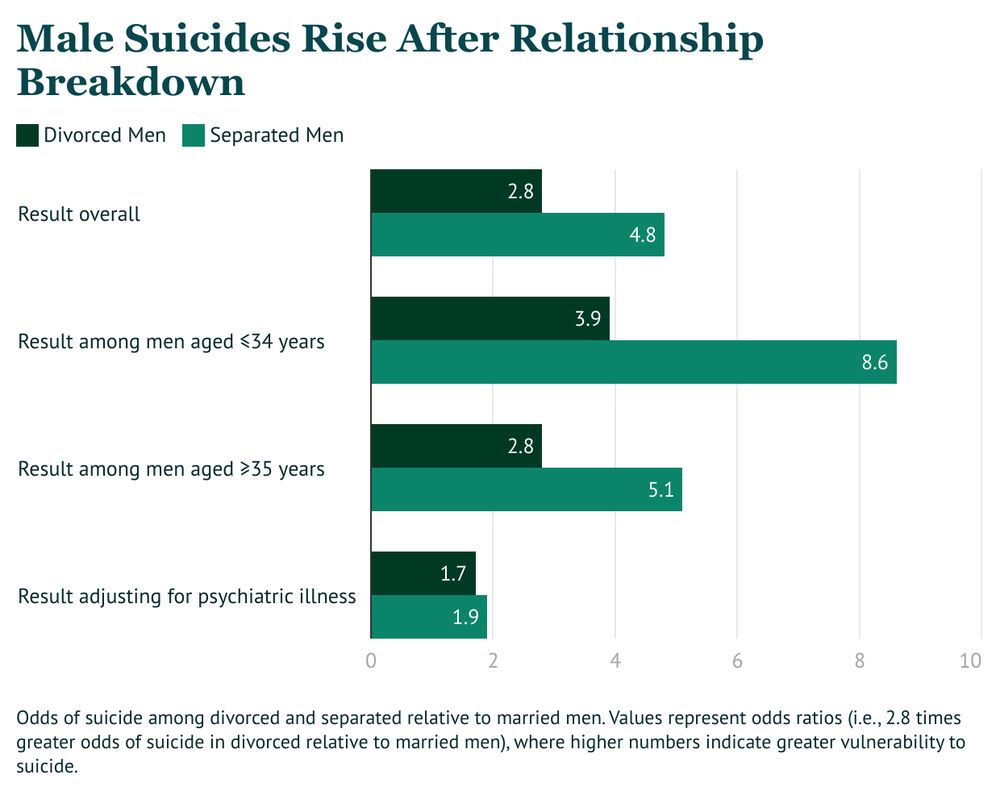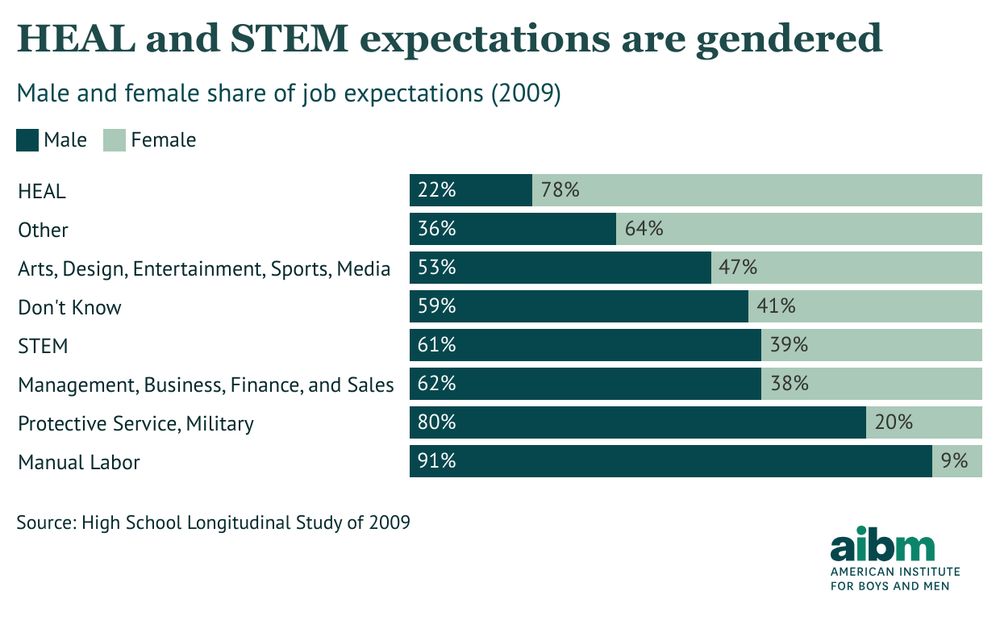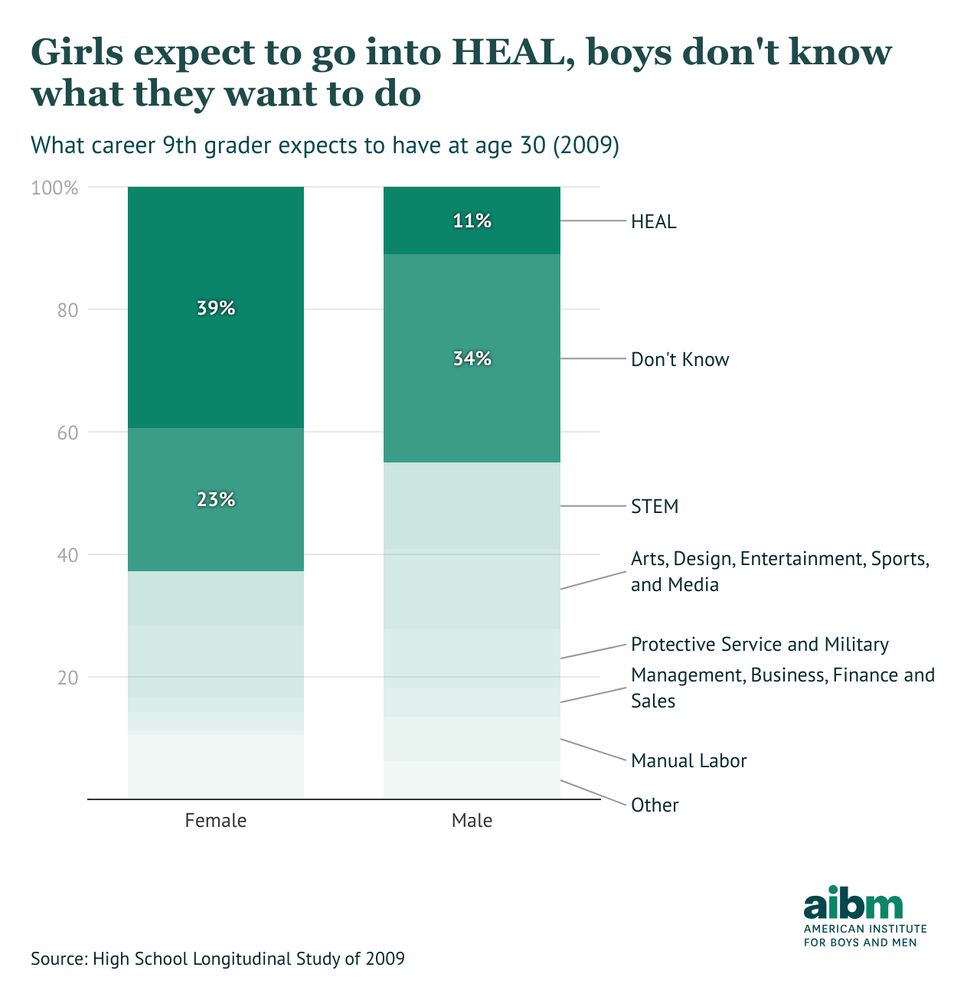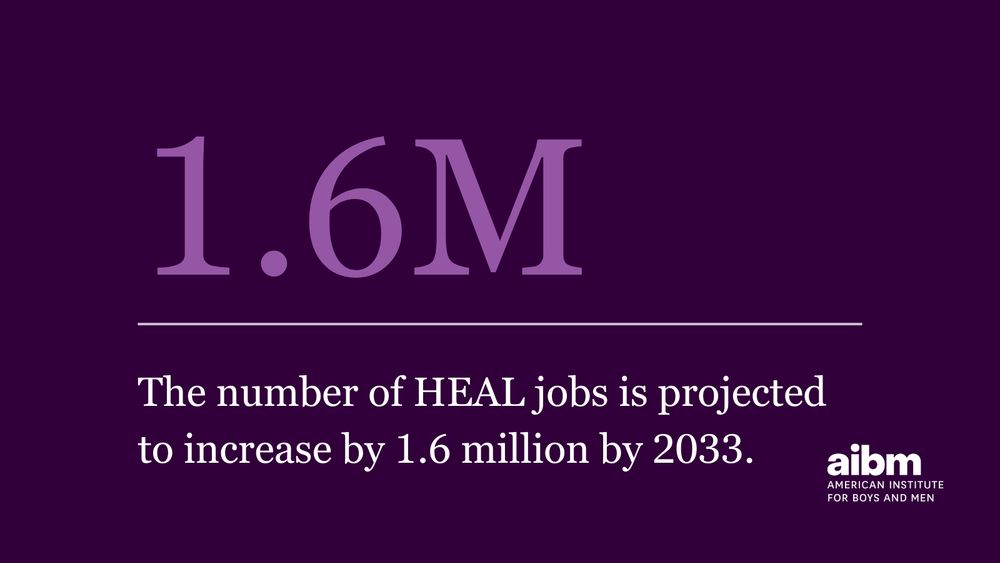American Institute for Boys and Men
@aibm.bsky.social
The only national research organization dedicated to issues affecting boys and men.
The American Institute for Boys and Men conducts non-partisan research on issues that affect the well-being of boys and men across the United States.
The American Institute for Boys and Men conducts non-partisan research on issues that affect the well-being of boys and men across the United States.
RAND looks at youth disconnection through a community lens and finds a clear pattern: in places where fewer adult men are working, more young people are disconnected.
Read more: www.rand.org/pubs/perspec...
Read more: www.rand.org/pubs/perspec...

November 5, 2025 at 4:59 PM
RAND looks at youth disconnection through a community lens and finds a clear pattern: in places where fewer adult men are working, more young people are disconnected.
Read more: www.rand.org/pubs/perspec...
Read more: www.rand.org/pubs/perspec...
5/7 Life events also matter.
Separation and relationship loss are associated with elevated suicide risk, particularly for men in midlife.
Separation and relationship loss are associated with elevated suicide risk, particularly for men in midlife.

September 10, 2025 at 4:34 PM
5/7 Life events also matter.
Separation and relationship loss are associated with elevated suicide risk, particularly for men in midlife.
Separation and relationship loss are associated with elevated suicide risk, particularly for men in midlife.
4/7 Occupational trends show similar patterns.
Construction workers experience the highest suicide rates of any major group. Other high-risk fields include repair and maintenance, farming and fishing, and protective services.
Construction workers experience the highest suicide rates of any major group. Other high-risk fields include repair and maintenance, farming and fishing, and protective services.

September 10, 2025 at 4:34 PM
4/7 Occupational trends show similar patterns.
Construction workers experience the highest suicide rates of any major group. Other high-risk fields include repair and maintenance, farming and fishing, and protective services.
Construction workers experience the highest suicide rates of any major group. Other high-risk fields include repair and maintenance, farming and fishing, and protective services.
3/7 Men without a bachelor’s degree die by suicide at more than twice the rate of college-educated men.
The gap is growing. Suicide rates have risen 53 percent for men without a degree, compared to 26 percent for those with one.
The gap is growing. Suicide rates have risen 53 percent for men without a degree, compared to 26 percent for those with one.

September 10, 2025 at 4:34 PM
3/7 Men without a bachelor’s degree die by suicide at more than twice the rate of college-educated men.
The gap is growing. Suicide rates have risen 53 percent for men without a degree, compared to 26 percent for those with one.
The gap is growing. Suicide rates have risen 53 percent for men without a degree, compared to 26 percent for those with one.
2/7 Suicide rates are four times higher among men than among women.
But risk is not evenly distributed. It varies significantly by age, educational attainment, occupation, and life experience.
But risk is not evenly distributed. It varies significantly by age, educational attainment, occupation, and life experience.

September 10, 2025 at 4:34 PM
2/7 Suicide rates are four times higher among men than among women.
But risk is not evenly distributed. It varies significantly by age, educational attainment, occupation, and life experience.
But risk is not evenly distributed. It varies significantly by age, educational attainment, occupation, and life experience.
What does the data say about loneliness and isolation among men and women?
Our researchers find that the trends aren’t too different. However, there are concerning divides among those with college degrees and those without.
Read the full brief: aibm.org/research/mal...
Our researchers find that the trends aren’t too different. However, there are concerning divides among those with college degrees and those without.
Read the full brief: aibm.org/research/mal...

August 21, 2025 at 7:42 PM
What does the data say about loneliness and isolation among men and women?
Our researchers find that the trends aren’t too different. However, there are concerning divides among those with college degrees and those without.
Read the full brief: aibm.org/research/mal...
Our researchers find that the trends aren’t too different. However, there are concerning divides among those with college degrees and those without.
Read the full brief: aibm.org/research/mal...
Compared to married men, divorced men had almost three times greater odds of death from suicide. Separated men had an almost five times higher risk.
This data reflects the intense emotional challenges that can follow relationship breakdown.
Learn more: aibm.org/commentary/s...
This data reflects the intense emotional challenges that can follow relationship breakdown.
Learn more: aibm.org/commentary/s...

July 25, 2025 at 4:10 PM
Compared to married men, divorced men had almost three times greater odds of death from suicide. Separated men had an almost five times higher risk.
This data reflects the intense emotional challenges that can follow relationship breakdown.
Learn more: aibm.org/commentary/s...
This data reflects the intense emotional challenges that can follow relationship breakdown.
Learn more: aibm.org/commentary/s...
Career ambitions in 9th grade already reflect sharp gender divides:
• 78% of students expecting HEAL careers are girls
• 61% of future STEM aspirants are boys
• Manual labor and protective service jobs skew 9:1 and 4:1 male
Full breakdown here: aibm.org/research/wha...
• 78% of students expecting HEAL careers are girls
• 61% of future STEM aspirants are boys
• Manual labor and protective service jobs skew 9:1 and 4:1 male
Full breakdown here: aibm.org/research/wha...

July 15, 2025 at 7:42 PM
Career ambitions in 9th grade already reflect sharp gender divides:
• 78% of students expecting HEAL careers are girls
• 61% of future STEM aspirants are boys
• Manual labor and protective service jobs skew 9:1 and 4:1 male
Full breakdown here: aibm.org/research/wha...
• 78% of students expecting HEAL careers are girls
• 61% of future STEM aspirants are boys
• Manual labor and protective service jobs skew 9:1 and 4:1 male
Full breakdown here: aibm.org/research/wha...
Ninth grade boys are more likely than girls to say they don’t know what job they’ll have at age 30.
For girls, HEAL jobs are the top choice. Boys’ interests are more spread out.
Read more: aibm.org/research/what-teens-want-to-be-gender-differences-in-careers-and-majors/
For girls, HEAL jobs are the top choice. Boys’ interests are more spread out.
Read more: aibm.org/research/what-teens-want-to-be-gender-differences-in-careers-and-majors/

June 30, 2025 at 8:00 PM
Ninth grade boys are more likely than girls to say they don’t know what job they’ll have at age 30.
For girls, HEAL jobs are the top choice. Boys’ interests are more spread out.
Read more: aibm.org/research/what-teens-want-to-be-gender-differences-in-careers-and-majors/
For girls, HEAL jobs are the top choice. Boys’ interests are more spread out.
Read more: aibm.org/research/what-teens-want-to-be-gender-differences-in-careers-and-majors/
“Every dad matters to every kid.”
@richardreeves.bsky.social joins Dr. Becky to talk fatherhood, masculinity, and getting boys and fathers the support they need.
Watch on Good Inside: youtube.com/watch?v=DEkOs55vec4
@richardreeves.bsky.social joins Dr. Becky to talk fatherhood, masculinity, and getting boys and fathers the support they need.
Watch on Good Inside: youtube.com/watch?v=DEkOs55vec4
June 11, 2025 at 8:00 PM
“Every dad matters to every kid.”
@richardreeves.bsky.social joins Dr. Becky to talk fatherhood, masculinity, and getting boys and fathers the support they need.
Watch on Good Inside: youtube.com/watch?v=DEkOs55vec4
@richardreeves.bsky.social joins Dr. Becky to talk fatherhood, masculinity, and getting boys and fathers the support they need.
Watch on Good Inside: youtube.com/watch?v=DEkOs55vec4
The HEAL sector (Health, Education, and Literacy) is expected to add 1.6 million jobs by 2033. With fewer men in these fields, there’s a big opportunity for men to tap into this growth.
Read more here: aibm.org/research/the-heal-economy/
Read more here: aibm.org/research/the-heal-economy/

May 15, 2025 at 7:42 PM
The HEAL sector (Health, Education, and Literacy) is expected to add 1.6 million jobs by 2033. With fewer men in these fields, there’s a big opportunity for men to tap into this growth.
Read more here: aibm.org/research/the-heal-economy/
Read more here: aibm.org/research/the-heal-economy/
This Teacher Appreciation Week, we are recognizing the value of role models in the classroom.
Male teachers can play an important role in boys' development. Our analysis suggests their presence may have a positive impact.
Read the brief: aibm.org/research/missing-misters/
Male teachers can play an important role in boys' development. Our analysis suggests their presence may have a positive impact.
Read the brief: aibm.org/research/missing-misters/

May 7, 2025 at 7:42 PM
This Teacher Appreciation Week, we are recognizing the value of role models in the classroom.
Male teachers can play an important role in boys' development. Our analysis suggests their presence may have a positive impact.
Read the brief: aibm.org/research/missing-misters/
Male teachers can play an important role in boys' development. Our analysis suggests their presence may have a positive impact.
Read the brief: aibm.org/research/missing-misters/
On #NationalApprenticeshipDay, it's worth asking why the U.S. prioritizes college over apprenticeships. Young men in particular could benefit from greater investment in hands-on training programs.
Read our commentary by @richardreeves.bsky.social and Will Secker: aibm.org/commentary/a...
Read our commentary by @richardreeves.bsky.social and Will Secker: aibm.org/commentary/a...

April 30, 2025 at 7:42 PM
On #NationalApprenticeshipDay, it's worth asking why the U.S. prioritizes college over apprenticeships. Young men in particular could benefit from greater investment in hands-on training programs.
Read our commentary by @richardreeves.bsky.social and Will Secker: aibm.org/commentary/a...
Read our commentary by @richardreeves.bsky.social and Will Secker: aibm.org/commentary/a...
Nearly All U.S. Teens Play Video Games
85% of U.S. teens play video games, and 89% play with others. Boys game more often (61% daily vs. 22% of girls) and use gaming for socializing more (94% vs. 82%).
85% of U.S. teens play video games, and 89% play with others. Boys game more often (61% daily vs. 22% of girls) and use gaming for socializing more (94% vs. 82%).

April 25, 2025 at 2:59 PM
Nearly All U.S. Teens Play Video Games
85% of U.S. teens play video games, and 89% play with others. Boys game more often (61% daily vs. 22% of girls) and use gaming for socializing more (94% vs. 82%).
85% of U.S. teens play video games, and 89% play with others. Boys game more often (61% daily vs. 22% of girls) and use gaming for socializing more (94% vs. 82%).
Why are boys falling behind in school? What can we do about it?
@wbur.org’s On Point explores the education crisis facing boys in the new series "Falling Behind: The Miseducation of America's Boys." Featuring @richardreeves.bsky.social.
Listen to the full series. Link in the description:
@wbur.org’s On Point explores the education crisis facing boys in the new series "Falling Behind: The Miseducation of America's Boys." Featuring @richardreeves.bsky.social.
Listen to the full series. Link in the description:

April 23, 2025 at 2:59 PM
Why are boys falling behind in school? What can we do about it?
@wbur.org’s On Point explores the education crisis facing boys in the new series "Falling Behind: The Miseducation of America's Boys." Featuring @richardreeves.bsky.social.
Listen to the full series. Link in the description:
@wbur.org’s On Point explores the education crisis facing boys in the new series "Falling Behind: The Miseducation of America's Boys." Featuring @richardreeves.bsky.social.
Listen to the full series. Link in the description:
#Homelessness Grew More for #Men in 27 States
In 27 states, plus Washington, D.C., homelessness increased more for men, with the largest gap in California. However, in 32 states, the growth rate of homelessness was higher for women.
In 27 states, plus Washington, D.C., homelessness increased more for men, with the largest gap in California. However, in 32 states, the growth rate of homelessness was higher for women.

April 14, 2025 at 5:00 PM
#Homelessness Grew More for #Men in 27 States
In 27 states, plus Washington, D.C., homelessness increased more for men, with the largest gap in California. However, in 32 states, the growth rate of homelessness was higher for women.
In 27 states, plus Washington, D.C., homelessness increased more for men, with the largest gap in California. However, in 32 states, the growth rate of homelessness was higher for women.
3/ Isaac Rose-Berman

April 10, 2025 at 4:00 PM
3/ Isaac Rose-Berman

April 10, 2025 at 4:00 PM
#Men Are the Majority of the #Homeless Population in Every State Except Massachusetts
California’s homeless population grew from 116,000 in 2015 to 187,000 in 2024, with 60% of the increase coming from men. Oregon saw a 73% rise, from 13,000 to nearly 23,000, also driven largely by men.
California’s homeless population grew from 116,000 in 2015 to 187,000 in 2024, with 60% of the increase coming from men. Oregon saw a 73% rise, from 13,000 to nearly 23,000, also driven largely by men.

April 7, 2025 at 5:00 PM
Are men OK?
A new profile on AIBM President Richard V. Reeves explores the growing challenges facing boys and men in education, work, and mental health and why these issues demand urgent attention.
Read the full article by Eamon Whalen: thenation.com/article/society/richard-reeves-profile/
A new profile on AIBM President Richard V. Reeves explores the growing challenges facing boys and men in education, work, and mental health and why these issues demand urgent attention.
Read the full article by Eamon Whalen: thenation.com/article/society/richard-reeves-profile/

April 4, 2025 at 8:00 PM
Are men OK?
A new profile on AIBM President Richard V. Reeves explores the growing challenges facing boys and men in education, work, and mental health and why these issues demand urgent attention.
Read the full article by Eamon Whalen: thenation.com/article/society/richard-reeves-profile/
A new profile on AIBM President Richard V. Reeves explores the growing challenges facing boys and men in education, work, and mental health and why these issues demand urgent attention.
Read the full article by Eamon Whalen: thenation.com/article/society/richard-reeves-profile/
U.S. #Homelessness Has Surged Since 2020
Since the pandemic, an additional 107,000 #men and 79,000 #women have become homeless. This represents a 30 percent increase for men and a 35 percent increase for women.
Since the pandemic, an additional 107,000 #men and 79,000 #women have become homeless. This represents a 30 percent increase for men and a 35 percent increase for women.

March 31, 2025 at 5:01 PM
U.S. #Homelessness Has Surged Since 2020
Since the pandemic, an additional 107,000 #men and 79,000 #women have become homeless. This represents a 30 percent increase for men and a 35 percent increase for women.
Since the pandemic, an additional 107,000 #men and 79,000 #women have become homeless. This represents a 30 percent increase for men and a 35 percent increase for women.
4/ Youth sports are a vital part of childhood, and we need real solutions to address this challenge: more coaches, reduced cost barriers, and policies that support—not exclude—students.

March 27, 2025 at 7:42 PM
4/ Youth sports are a vital part of childhood, and we need real solutions to address this challenge: more coaches, reduced cost barriers, and policies that support—not exclude—students.
3/ So what’s happening here? A few possible reasons keeping many boys away:
• Competing time with screens
• Cost barriers preventing more boys from playing
• “No pass, no play” academic policies, which especially impact boys
• Post-pandemic effects
• Competing time with screens
• Cost barriers preventing more boys from playing
• “No pass, no play” academic policies, which especially impact boys
• Post-pandemic effects

March 27, 2025 at 7:42 PM
3/ So what’s happening here? A few possible reasons keeping many boys away:
• Competing time with screens
• Cost barriers preventing more boys from playing
• “No pass, no play” academic policies, which especially impact boys
• Post-pandemic effects
• Competing time with screens
• Cost barriers preventing more boys from playing
• “No pass, no play” academic policies, which especially impact boys
• Post-pandemic effects



